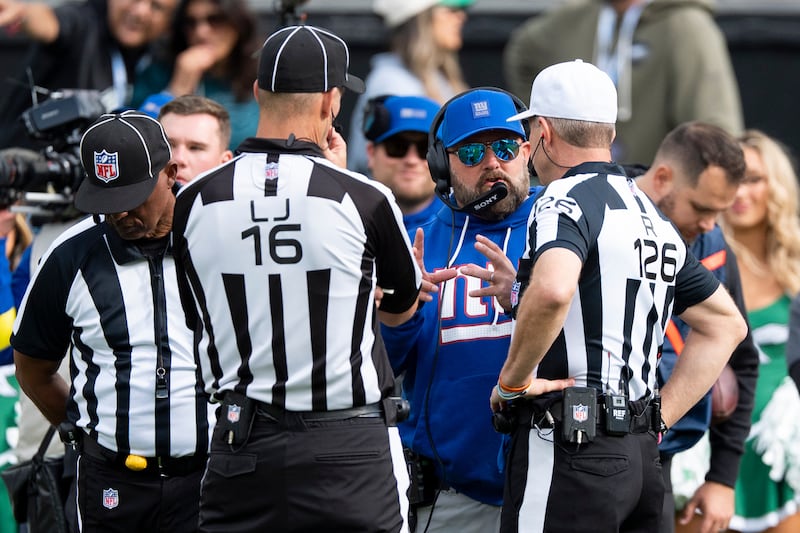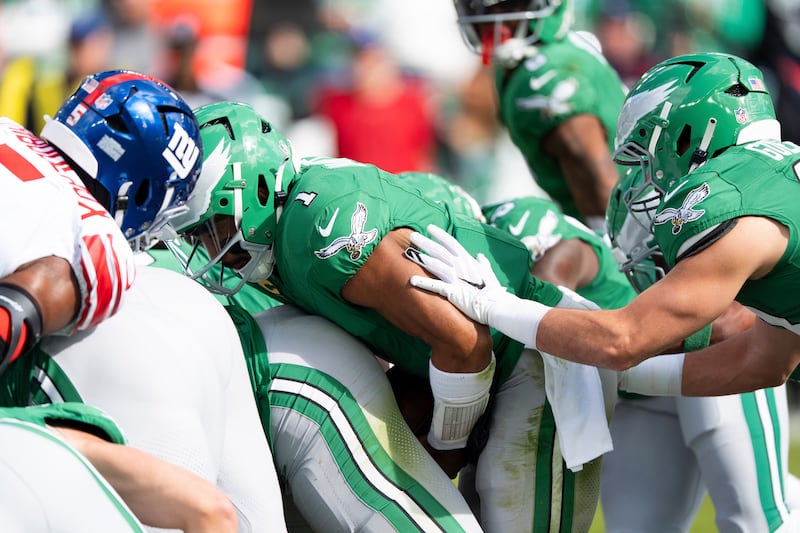That does it. It’s time to give the tush push a push out the door. Actually, it’s well past that time. The tush push was already on thin ice with league owners and then a single play during last Sunday’s Giants-Eagles game all but guaranteed it will be banned in the offseason.
It was a single play that sent everyone over the edge. A CBS headline put it best: “The tush push didn’t die in a meeting room; it died on a Sunday in Philadelphia.”
The media backlash was unanimous.
Facing a fourth-and-1 at the Giants’ 11-yard line, the Eagles ran the tush push. Jalen Hurts, the team’s 225-pound quarterback, churned into the scrum, low to the ground, his teammates pushing him from behind, as usual. As Hurts stretched the ball ahead, trying to gain more yardage, Giants defender Kayvon Thibodeaux ripped the ball out of his hands and the Giants recovered the fumble.
Finally, someone had stopped the tush. But, wait. The officials ruled that Hurts’ momentum had been stopped; the play was over before the fumble, so there was no fumble (even though no one heard a whistle signaling as much).
What?!
On every tush push, it appears that Hurts’ forward progress is stopped, but the play is always allowed to continue and results in a few more inches or feet, until he finally touches the ground. It moves forward with the speed of a sloth, grinding in slow motion in a mash of 300-pound bodies. It’s pretty much impossible to determine exactly when forward motion has actually stopped.
If the play was already mostly unstoppable, officials just guaranteed it.
This only piled on growing evidence that the play needs to go. Earlier this season, in two separate games, referees failed to see false starts by the Eagles linemen in the compacted mass of bodies — once against the Chiefs and once against the Rams. If referees are allowing Eagles linemen to start their blocks before the snap of the ball, giving them an even bigger advantage, what chance do opponents have?
Officials say it’s difficult to see what’s happening in the scrum.
If officials cannot officiate the tush push — and they can’t — then it’s time to end it.
And that’s not even getting into all the other reasons it should go.
The Eagles’ tush push has a 96.6% success rate on fourth down since 2022. The NFL changed the extra-point kick because it had a 99.3% success rate, pushing it back from the 2-yard line to the 15-yard line.
Last Sunday the Giants ran tush four consecutive times until they scored. That was only a little more exciting than sumo wrestling.
Go figure. In 2013, the NFL banned defensive players from pushing their teammates into the offense — the tush push in reverse. The reason for the rule change was “safety” — to protect the offensive line and long snapper from injury. If it’s a safety issue when the defense does it, why isn’t it a safety issue when the offense does it? Eagles tackle Lane Johnson incurred a stinger against the Rams earlier this season during the tush push.
The play is already banned in college and high school games, which have rules that prohibit an offensive player from pushing, pulling or lifting a runner to assist forward progress (although BYU was allowed to push and pull quarterback Bear Bachmeier into the end zone against Utah).
The tush push is ugly, a throwback to the flying wedge, which was banned 150 years ago in college football. To execute the tush, the offense lines up in a rugby scrum and pushes the ball through the defense. All that’s needed is leather helmets to complete the look.
Last May, for the second time in two months, the NFL considered banning the tush push and it went to a vote by the owners, again. This time it survived by just two votes.
Rich McKay, chairman of the NFL’s competition committee, told ESPN at the time, “There are a bunch of teams that support (the ban), committees that support it. It will be talked about again.”
And so it is.



